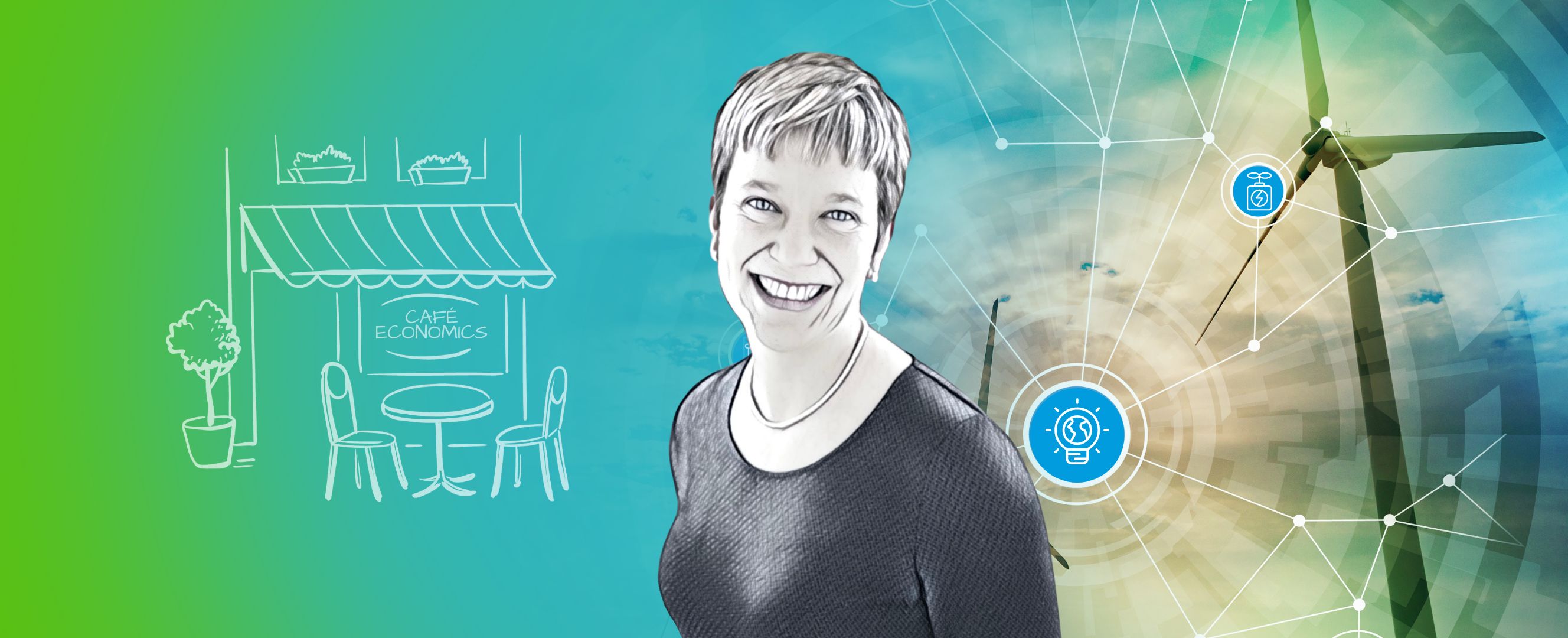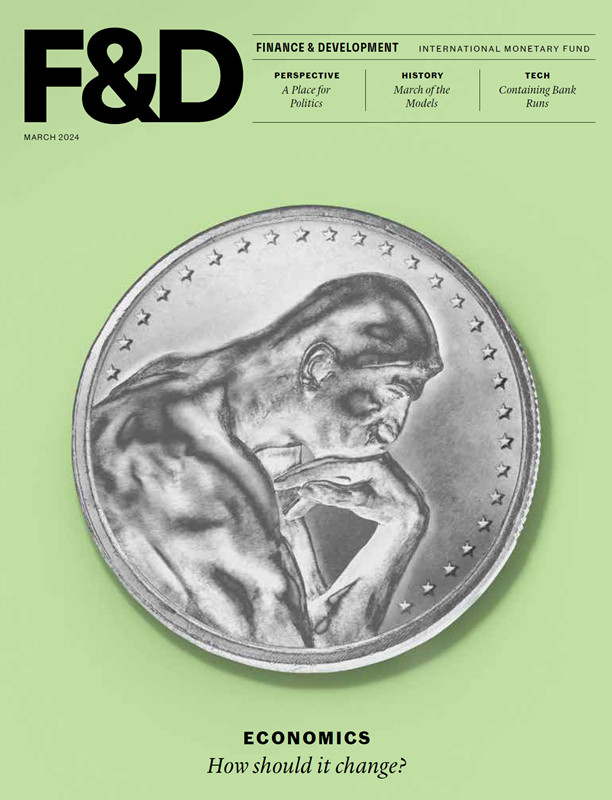Samantha Gross discusses how the current crisis creates an impetus to tackle climate change while achieving energy security
As energy bills soar globally and countries scramble to secure energy sources, the impact of the current energy crisis is likely to be profound.
Ahead of the December 2022 issue of F&D, which will take a deep dive into the current energy upheaval, the director of Brookings’ Energy Security and Climate Initiative, Samantha Gross, discusses with F&D’s Marjorie Henriquez how the crisis started, the implications for developing economies, and the risks of a fragmented energy market. Gross argues that the energy crisis should be the driver of a transition to clean energy—not an impediment.
F&D: The current energy crisis is affecting the entire world. How did we get here? Is Russia’s war in Ukraine mainly to blame?
SG: The current energy situation started during the coronavirus pandemic. At that time, we saw demand for transportation fuels—made from oil—drop tremendously because people weren’t going anywhere. This meant that oil producers were losing money, so they slowed down investment and production. As we were coming out of the pandemic—even before the war in Ukraine—demand recovered more quickly than supply did, which led to an oil supply crunch.
It’s important to understand that the European energy crisis is on the natural gas side—that is, less rooted in the pandemic and more rooted in European countries’ dependence on Russian natural gas as part of their energy transitions—in their phasing out of coal and phasing in of renewables. Some countries, such as Italy, became quite dependent on Russian natural gas for power generation. In Germany, gas is more important for home heating and industry. Some of those uses will be very difficult to decarbonize, such as in high-heat applications like glass manufacturing. Others are easier to decarbonize but will take time, such as replacing gas heating in homes with electric heat pumps.
Russian natural gas has played an important role in the energy system of Europe, not just because of a choice to rely on it, but also because Europe’s native natural gas production has decreased. With the invasion of Ukraine, most countries don’t want their energy thirst to finance Russia’s war on Ukraine. But the truth is, the world needs Russian energy—and that leaves us in a really bad spot.
F&D: How is this crisis different from the energy crunch of the 1970s?
SG: During the crunch of the 1970s, we saw producers pulling oil off the market, saying, “we’re not going to sell you our oil.” We are seeing the opposite with respect to Russia. Buyers are saying, “we don’t want to buy your oil.”
The other difference from prior energy crises is that this is our first global natural gas crisis. Natural gas used to be an entirely regional fuel. It went through pipelines, and those pipelines were like a marriage—countries supplied natural gas through the pipeline from one end to the other, and those were very long-term, stable relationships. And those relationships still exist, like Russia had with Europe. But the rise of liquefied natural gas (LNG) has, in a sense, globalized natural gas supply, and so now a crisis in one place can spread to others through the LNG market. Because Europe is sucking in all of the world’s LNG and raising prices for everyone, the crisis in Russian gas supply to Europe has spread now to Asia, for instance. This is the first time we’ve seen a natural gas crisis go global like this.
F&D: Some countries have announced that they will be restarting coal plants. How can countries reconcile their current energy needs with their decarbonization goals?
SG: You can only change the energy system so fast. So we have to feed the system we have right now, and in some cases, that means going back to coal in power generation to save natural gas for other uses. This is unfortunate, but at the same time, we can’t abandon the energy transition, because over the long term that is the solution to the current problem.
What we are seeing, particularly in Europe, is the understanding that the natural gas crisis should be the driver of an energy transition, not an impediment. An energy system less dependent on fossil fuels is less susceptible to crises. In the meantime, it’s a difficult situation, and we may see emissions go up because of that additional coal use. But we can’t let the economy shut down—we have to work with the energy system we have.
F&D: Could hydrogen become the fuel of the future?
SG: Hydrogen may look like a fuel, but it actually isn’t—it’s an energy carrier, like electricity. Unlike oil or natural gas, you don’t go out and drill for hydrogen. You produce hydrogen from another form of energy. But hydrogen has a lot of the physical aspects of a fuel—you can store it in tanks, transport it in pipelines, and burn it like a fuel. It’s also very energy-dense—it doesn’t weigh much for the amount of energy that it carries. These fuel-like properties can be very useful.
You can make hydrogen by using renewable or other electricity to split water molecules. You can also split natural gas molecules, sequester the carbon part, and use the hydrogen. Because you’re using another form of energy to make hydrogen, you don’t want to use hydrogen when you can use that other form of energy directly, for efficiency reasons.
F&D: With energy prices at a 14-year high, who should shoulder the burden of rising costs?
SG: It’s a really difficult question. I understand the reluctance to have households shoulder the burden of Putin’s war. From an economic perspective, however, households who can afford it should pick up the bill—it sends the right incentives for replacing their gas furnace with electricity, for instance, and for conservation. Europe is not just facing high prices, but there is the real possibility of gas shortages—not just the kind of shortage that is balanced out by price. A genuine gas shortage that may leave people freezing in the wintertime.
However, there should be generous definitions of who needs help—you don’t want vulnerable households carrying the burden of Russia’s war. This view may come from a place of privilege, but there needs to be a price signal for those who can afford it—and one powerful way to impact demand is through price.
F&D: What has been the impact on developing economies?
SG: Although Europe gets all the attention because they are facing actual gas shortages, the developing world is what I worry about. Today’s fuel prices are unaffordable for lower-income countries. They may also struggle to find natural gas at all given that Europe is pulling in a large percentage of the world’s LNG supply. Governments in developing countries are also less able to subsidize energy for large parts of their populations who are likely in need. We have already seen large-scale protests against inflation in Argentina, Ecuador, and Sri Lanka, and more unrest is likely if the situation continues.
The energy crisis is also concerning because it could slow the low-carbon energy transition in those countries. Right now, every form of energy and energy-generation equipment is expensive. This leaves poorer countries in a very difficult spot.
F&D: The war has raised fears of geopolitical and geoeconomic fragmentation. What are the risks of a fragmented energy market?
SG: A fragmented energy market is less secure for everybody. I understand the current urge to create alliances with some countries and alienate others. But the energy market is less secure if it is fragmented.
In my view, Russia will never be viewed as a trustworthy provider of energy ever again. And as the energy transition moves forward, there is an emphasis on reducing demand for fossil fuels. But now there is a specific impetus—to reduce demand for Russian fossil fuels. We are likely to see a preferential phaseout of Russian fuels because they’ve proven that their supplies are completely politically driven. I hope that this phasing out doesn’t lead into a further fragmentation of energy markets, because this would be less secure for everybody and likely to result in higher prices.
F&D: What is likely to be the most profound impact of the current energy crisis?
SG: The impact is incredibly profound for the Russian economy for all the reasons that I just mentioned. They were already going to face problems with the energy transition because their economy is very dependent on fossil fuel exports. That just got sooner and steeper.
For the rest of the world, my hope is that leaders understand that an economy and an energy system that are less dependent on fossil fuels prevent these problems in the first place.
Let me also emphasize that this is not only a climate change issue—it’s also an energy security concern. If we create an energy system that is based on renewables and other forms of zero-carbon electricity, we create a system that is by nature more local and less involved in geopolitics.
This interview has been edited for length and clarity.
Opinions expressed in articles and other materials are those of the authors; they do not necessarily reflect IMF policy.









